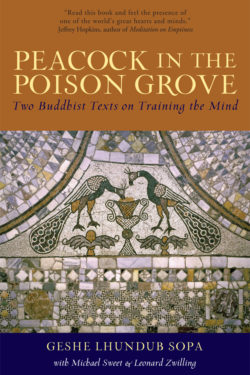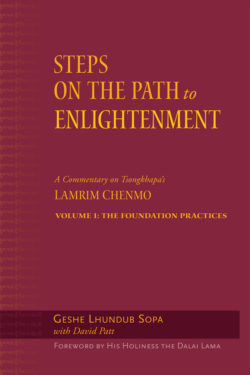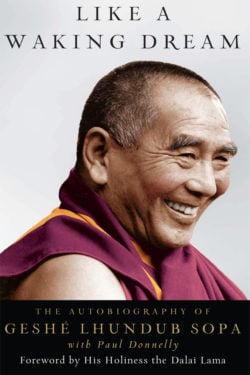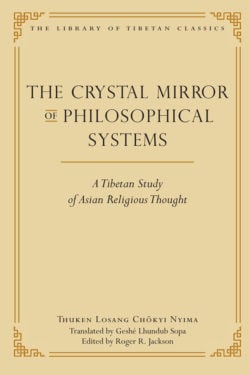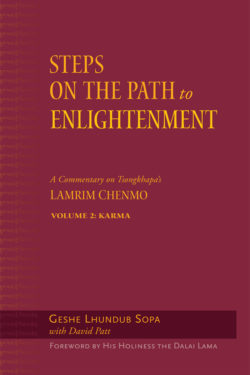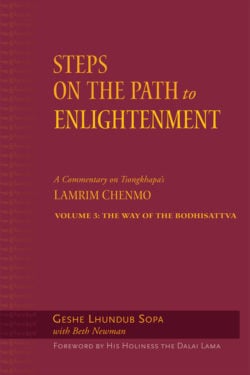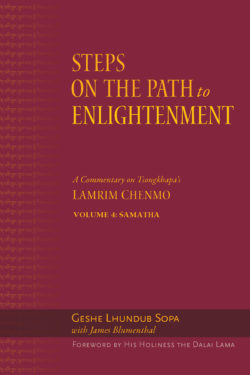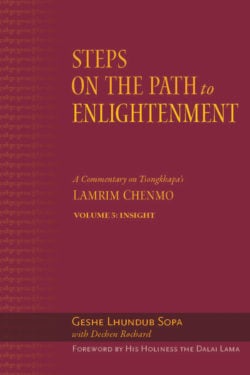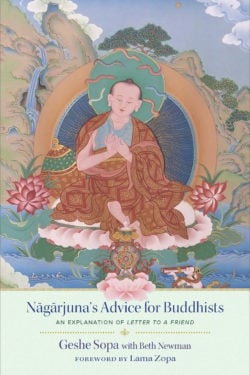Geshe Lhundub Sopa
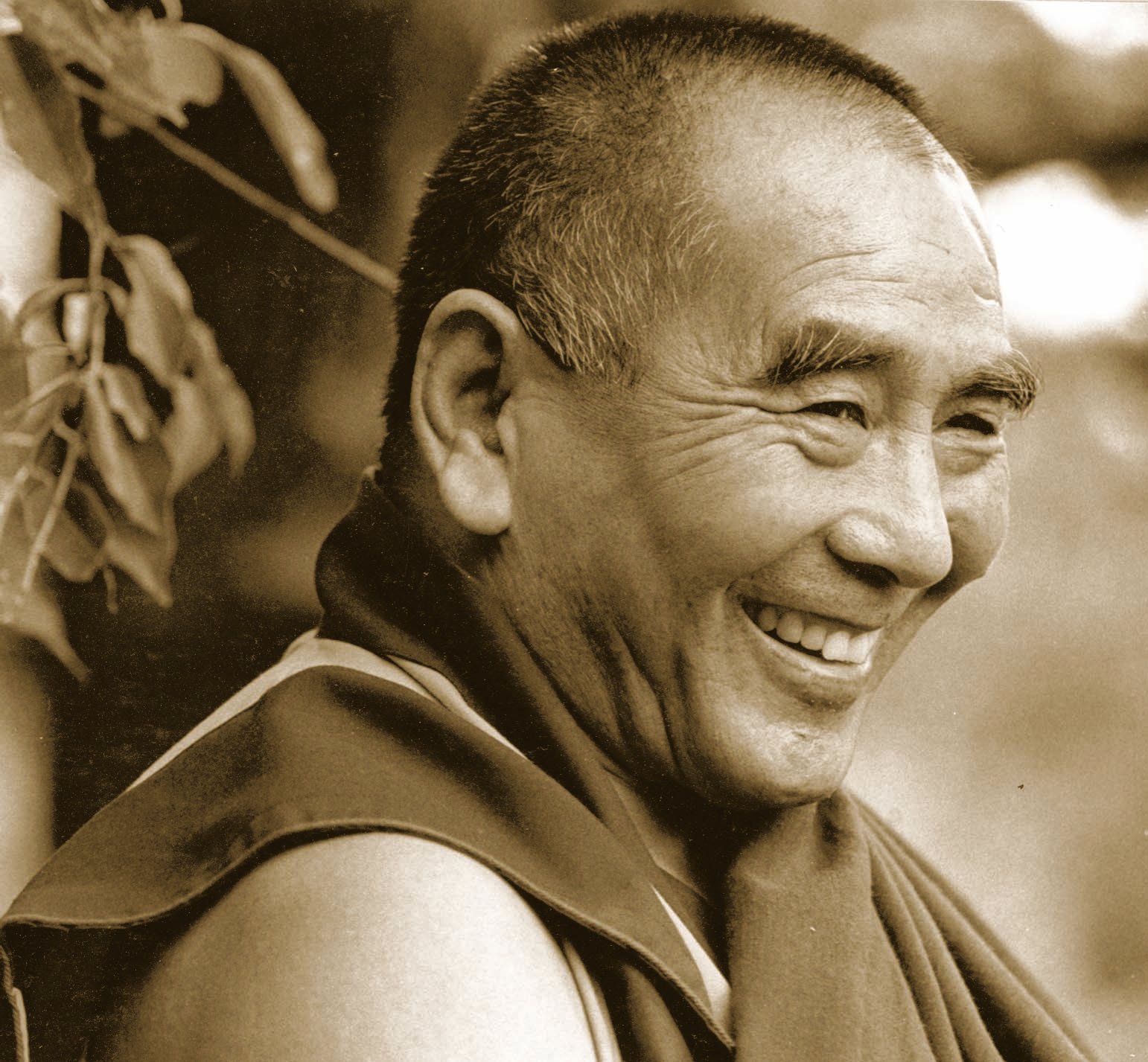
Born in the Tsang region of Tibet in 1923, Geshe Lhundub Sopa was both a spiritual master and a respected academic. He rose from a humble background to complete his geshe studies at Sera Je Monastic University in Lhasa with highest honors and was privileged to serve as a debate opponent for the Dalai Lama’s own geshe examination in 1959. He moved to New Jersey in the United States in 1963 and in 1967 began teaching in the Buddhist Studies Program at University of Wisconsin–Madison, where he was professor emeritus. In 1975, he founded the Deer Park Buddhist Center in Oregon, Wisconsin, site of the Dalai Lama’s first Kalachakra initiation granted in the West. He is the author of several books in English, including the five-volume comprehensive teaching, Steps on the Path to Enlightenment.
Geshe Lhundub Sopa passed away on August 28, 2014, at the age of 91. His Holiness the Dalai Lama composed a prayer of request for the swift return of Geshe Sopa.
Books, Courses & Podcasts
Peacock in the Poison Grove
Geshe Sopa offers insightful commentary on two of the earliest Tibetan texts that focus on mental training. Peacock in the Poison Grove presents powerful yogic methods of dispelling the selfish delusions of the ego and maintaining purity in our motives. Geshe Sopa’s lucid explanations teach how we can fight the egocentric enemy within by realizing the truth of emptiness and by developing a compassionate, loving attitude toward others.
Steps on the Path to Enlightenment, Vol. 1
Steps on the Path to Enlightenment: The Foundation Practices marks the first volume of a much-anticipated, comprehensive commentary on the Lamrim Chenmo by the renowned Buddhist scholar, Geshe Sopa.
This landmark commentary on what is perhaps the most elegant Tibetan presentation of the Buddhist path offers a detailed overview of Buddhist philosophy, especially invaluable to those wanting to enact the wisdom of the Buddha in their lives.
In the Lamrim Chenmo, Tsongkhapa explains the path in terms of the three levels of practitioners: those of small capacity who seek happiness in future lives, those of medium capacity who seek liberation from the cycle of suffering, and those of great capacity who seek full enlightenment in order to benefit all beings. This volume covers the topics common to the first level: Tsongkhapa’s explanations of the role of the teacher, his exhortation to take the essence of human existence, the contemplation of death and future lives, and going for the refuge.
Given his vast knowledge and his experience in both Tibetan and Western contexts, Geshe Sopa is the ideal commentator of this work for the modern student of Tibetan Buddhism.
Read Tsongkhapa’s biography at the Treasury of Lives.
Like a Waking Dream
Among the generation of elder Tibetan lamas who brought Tibetan Buddhism west in the latter half of the twentieth century, perhaps none has had a greater impact on the academic study of Buddhism than Geshé Lhundub Sopa. He has striven to preserve Tibetan religious culture through tireless work as a professor and religious figure, establishing a functioning Buddhist monastery in the West, organizing the Dalai Lama’s visits to the U.S., and offering countless teachings across the country. But prior to his thirty-year career in the first ever academic Buddhist studies program in the United States—a position in which he oversaw the training of many among the seminal generation of American Buddhist studies scholars—Geshé Sopa was the son of peasant farmers, a novice monk in a rural monastery, a virtuoso scholar-monk at one of the prestigious central monasteries in Lhasa, and a survivor of the Tibetan uprising and perilous flight into exile in 1959.
In Like a Waking Dream, Geshé Sopa frankly and observantly reflects on how his life in Tibet—a monastic life of yogic simplicity—shaped and prepared him for the unexpected. His is a tale of an exemplary life dedicated to learning, spiritual cultivation, and the service of others from one of the greatest living masters of Tibetan Buddhism.
The Crystal Mirror of Philosophical Systems
The Crystal Mirror of Philosophical Systems, by Thuken Losang Chökyi Nyima (1737–1802), is arguably the widest-ranging account of religious philosophies ever written in pre-modern Tibet. Like most Tibetan texts on philosophical systems, this work covers the major schools of India, both Buddhist and non-Buddhist, but then goes on to discuss in detail the entire range of Tibetan traditions as well, with separate chapters on the Nyingma, Kadam, Kagyü, Shijé, Sakya, Jonang, Geluk, and Bön schools. Not resting there, Thuken goes on to describe the major traditions of China—Confucian, Daoist, and the multiple varieties of Buddhist—as well as those of Mongolia, Khotan, and even Shambhala. The Crystal Mirror of Philosophical Systems is unusual, too, in its concern not just to describe and analyze doctrines, but to trace the historical development of the various traditions. The Crystal Mirror of Philosophical Systems is an eloquent and erudite presentation exploring the religious history and philosophical systems of an array of Asian Cultures—and offering evidence that the serious and sympathetic study of the history of religions has not been a monopoly of Western scholarship.
Learn more about the Library of Tibetan Classics
Learn about becoming a benefactor of the Library of Tibetan Classics
Learn more about Thuken Losang Chökyi Nyima at the Treasury of Lives.
Steps on the Path to Enlightenment, Vol. 2
This second volume of the five-volume commentary by the renowned Buddhist scholar Geshe Lhundub Sopa focuses on the key Buddhist concepts of karma, or cause and effect, and dependent origination. Considered one of the finest living Buddhist scholars, Geshe Sopa provides commentaries essential for anyone interested in a sound understanding of Tibetan Buddhist practice and philosophy. Never has a book gone into such clear detail on karma and dependent origination—concepts which, despite many references in contemporary culture, are too often misunderstood. Here, Geshe Sopa starts from the beginning with a faithful reading of the Lamrim Chenmo and, in the end, leaves readers with the proper tools for incorporating core Buddhist concepts into their study, teaching, and practice.
Read Tsongkhapa’s biography at the Treasury of Lives.
Steps on the Path to Enlightenment, Vol. 3
Geshe Lhundub Sopa’s Steps on the Path to Enlightenment is a landmark commentary on what is perhaps the most elaborate and elegant Tibetan presentation of the Buddhist path, Tsongkhapa’s monumental Lamrim Chenmo. In this third volume of five, readers are acquainted with the bodhisattva’s path and the altruistic desire to make service to others the driving force of spiritual development.
It begins with an explanation of what distinguishes the Mahayana practitioner from other Buddhists and goes on to describe the nature of bodhichitta. Geshe Sopa then provides a detailed commentary on the two methods to develop this awakening attitude: the techniques of sevenfold cause-and-effect and exchanging self and other.
While bodhichitta’s significance in Mahayana Buddhism is universally known, Geshe Sopa illustrates how bodhichitta can motivate a devoted practitioner toward complete enlightenment and how this is accomplished through the performance of the bodhisattva perfections. Whether engaged in a scholarly study or personal practice of the Lamrim Chenmo, Geshe Sopa’s guiding voice leads readers to a deeper understanding and appreciation of the bodhisattva way.
Steps on the Path to Enlightenment, Vol. 4
Geshe Sopa continues his elucidation of Lama Tsongkhapa’s masterwork on the Buddhist path with an explanation of the core meditative practice of śamatha, or calm abiding.
Showing how it is absolutely essential for—and goes hand in hand with—the achievement of insight into reality, he gives practical tips for countering sleepiness, agitation, and their more subtle counterparts. Leading us step by step toward deeper levels of concentration, volume 4 of the Steps on the Path to Enlightenment series brings readers closer to the ultimate goal of śamatha: unlimited and effortless focus.
Steps on the Path to Enlightenment, Vol. 5
The late Geshe Sopa was a refugee monk from Tibet sent to the United States by the Dalai Lama in 1963. He became a professor at the University of Wisconsin, training a generation of Western Buddhist scholars, and was a towering figure in the transmission of the Buddhism to the West. In this fifth and final volume of his commentary on Lama Tsongkhapa’s masterwork on the graduated steps of the Buddhist path, Geshe Sopa explains the practice of superior insight, or wisdom, the pinnacle of the bodhisattva’s perfections. All the Buddhist practices are for the purpose of developing wisdom, for it is wisdom that liberates from the cycle of suffering. All other positive actions, from morality to deep states of meditation, have no power to liberate unless they are accompanied by insight into the nature of reality. With unparalled precision, Geshe Sopa unpacks this central principle with scholarly virtuosity, guiding the reader through the progressive stages of realization.
Nāgārjuna’s Advice for Buddhists
An introduction to Buddhism by one of the tradition’s most famous authors, and a teaching on how to live a Buddhist life in contemporary society.
Letter to A Friend, by the great Indian philosopher Nāgārjuna, is one of the best-known introductions to Buddhism in classical Indian Buddhist literature. In this warm and generous commentary, one of the twentieth century’s most beloved teachers, Geshe Lhundup Sopa, shows how Nāgārjuna’s advice on how to follow Buddhist ethics while living fully in the world speaks just as clearly to us today as it did to the Indian king for whom it was composed.
Nāgārjuna maintained that all Buddhists can embody the full teachings of the Buddha. Therefore, this book covers topics from simple virtues to the most profound truths of emptiness. Expertly compiled by his student, scholar Beth Newman, from talks given over a number of years, the commentary brings this ancient Buddhist teaching to a modern audience.

